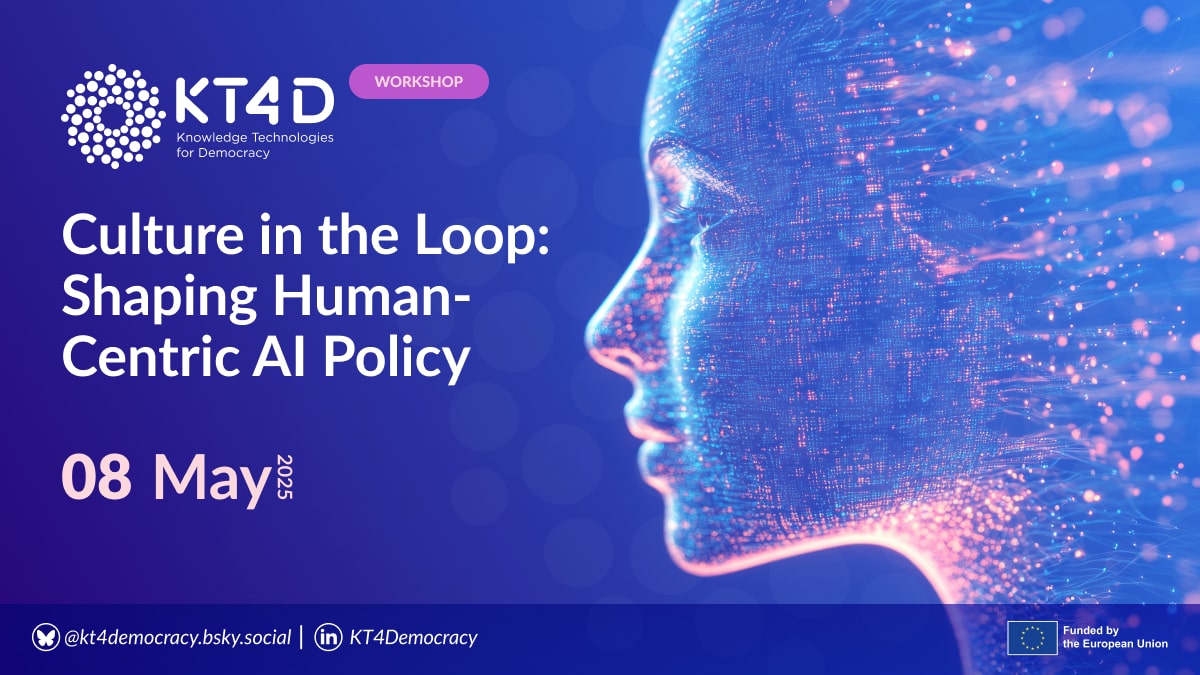Culture in the Loop: Shaping Human-Centric AI Policy

As Artificial Intelligence continues to shape civic life, cultural identity, and access to knowledge, understanding its broader societal and political impacts is more urgent than ever. Policymakers are under growing pressure to make evidence-based decisions which are not only sound but appropriate, transparent, and trustworthy. Citizens increasingly demand context-specific policies that reflect shared values.
Why Culture in the Loop
The Knowledge Technologies for Democracy project (KT4D) argues that current regulatory frameworks, such as the AI Act and the Digital Services Act, do not adequately account for cultural risks or how AI technologies affect public trust, participation, and collective sense-making.
In order to bring the culture’s role in the heated debate around AI and policy making in the era of fast-paced technological development, the KT4D project hosts a special policy workshop on 8 May 2025 to gather feedback on the role of culture in AI and Knowledge Technologies, based on the Culture’s Role in Navigating Technological Change publication. The aim is to engage directly with policymakers only on how cultural factors influence the risks and impacts of AI, and how policy frameworks can better reflect democratic values and public expectations.
Culture and the European Democracy Shield
The workshop offers a space for practical, grounded dialogue between researchers and policymakers to test these findings and discuss the implications for regulation, implementation, and democratic engagement. Recent events underscored the pertinence of the topic. Romania has lately become the first EU country to cancel an election over foreign interference, following reports about information manipulation on TikTok. Moreover, there’s growing concern around misinformation and disinformation on social media platforms and risks they present to the integrity of elections in Europe. The European Parliament has recently voted to establish a new Special Committee on the European Democracy Shield.
Democracy cannot be taken for granted. Against this backdrop, the discussion on the role of culture in a potential European democracy shield could hardly have been more timely. This workshop is not about delivering final answers, but about refining the policy interventions in dialogue with those who shape public decisions. It will surface different viewpoints, challenge assumptions, and test the feasibility of KT4D’s recommendations in real-world contexts. The outcome will be a stronger, more responsive policy position – one that recognises the value of culture in navigating technological change and reflects the principles of evidence-informed policymaking.
Agenda
| Time | Speaker and session |
|---|---|
| 14:00 | Opening Remarks | Jennifer Edmond, Professor in Digital Humanities, Trinity College Dublin, KT4D Coordinator & Workshop Moderator |
| 14:10 | Exploring the Concept of AI as a Source of Cultural Risk | Eleonora Lima, Research Fellow in Digital Humanities at Trinity College Dublin |
| 14:25 | From Awareness to Action: Integrating Cultural Insight in AI Governance | Furkan Akar, Project Officer and Researcher at Beyond the Horizon ISSG |
| 14:40 | Q&A |
| 14:45 | Perception of the use of AI in society: A psychological perspective | Giusy Cirillo, Postdoctoral Researcher in applied social cognition at Strane Innovation |
| 14:55 | Governance framework, policy roadmap and recommendations | Atte Ojanen, Research Manager at Demos Helsinki and a Doctoral Researcher at the University of Turku |
| 15:05 | Breakout Room 1 - Societal challenges of content creation with generative AI |
| 15:05 | Breakout Room 2 - Governance framework, policy roadmap and recommendations |
| 15:20 | Reconvene and Discuss recommendations from breakout sessions |
| 15:30 | Closing |